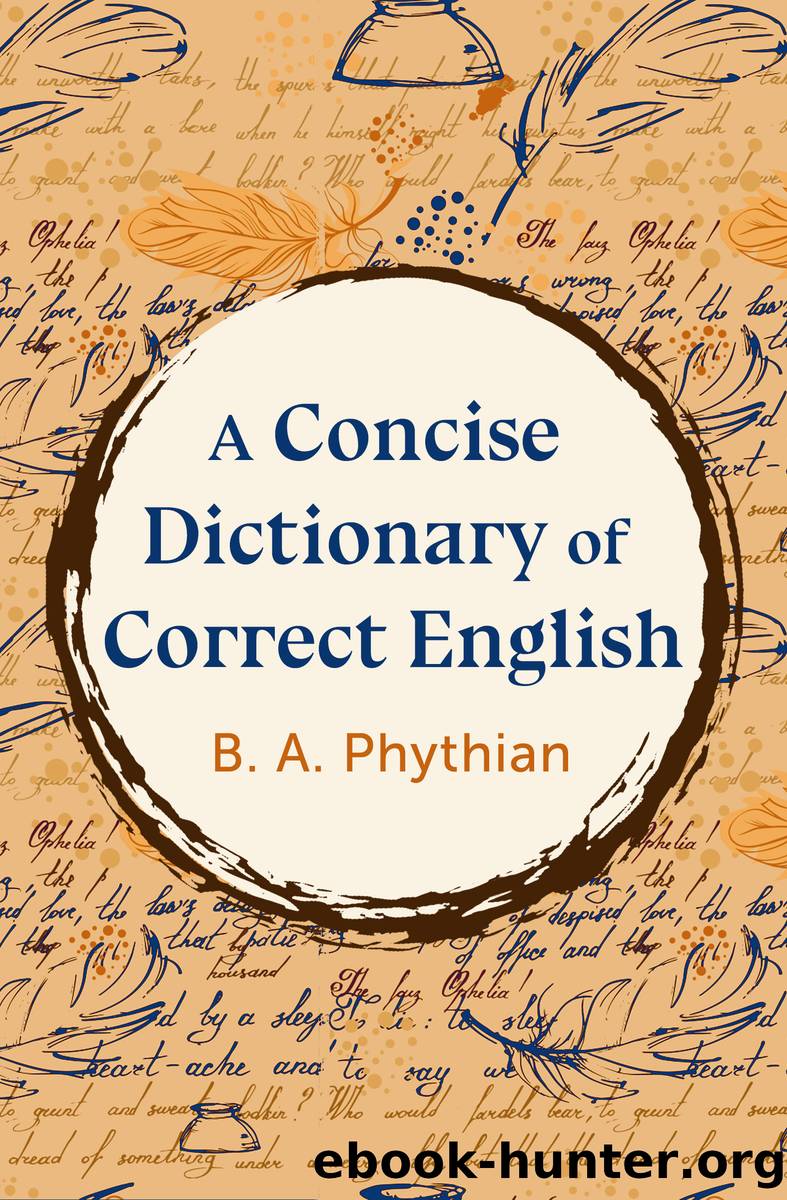A Concise Dictionary of Correct English by Phythian B.;

Author:Phythian, B.;
Language: eng
Format: epub
Publisher: Open Road Integrated Media, Inc.
Published: 2022-02-15T00:00:00+00:00
moot is frequently pronounced as mute is. This is wrong. Moot is pronounced as written, and has quite different meanings from those of mute (see mute). Moot is most frequently found as an adjective (meaning debatable, as in a moot point) or a verb (meaning raise for discussion, as in This policy was first mooted at last yearâs conference).
morale, with the final syllable pronounced arl, means spirits, state of mind, as in the refugeesâ morale, i.e. their confidence, happiness, discipline. It has nothing to do with morals, or morality.
more, most. The former is used in comparing two persons or things, the latter in comparing more than two:
He is the more aggressive of the two players.
He is the most talented player in the team.
more than one requires a singular verb, as in
More than one famous statesman has been caught out in a similar way.
most should not be used in comparing two persons or things, as in
The resort has two piers, of which the East Pier is the most visited.
Use more when comparing two things, and reserve most for comparison referring to more than two. See adjective 1, 4, more, most.
most, as an adverb, means in the highest degree. Mostly, also as an adverb, means in the main. There is therefore a substantial difference between Lunch was most enjoyable and Lunch was mostly enjoyable, but the difference was not noted by the journalist who wrote
The Budget is designed to help those mostly in need.
mostly. See most.
Mr and Mrs do not need full stops after them.
Ms, apparently pronounced either Miz or to rhyme with the second syllable of farmers, is preferred to Mrs or Miss by liberated women who do not regard their marital status as a fit subject for public knowledge. Mercifully, the use of Ms does not much exist outside a handful of newspapers which are written or read by liberated women. The word is foolish, ugly, meaningless and almost unpronounceable, and deserves oblivion.
much less is often used where logic requires much more, as in
It is difficult to reduce, much less to stamp out, the amount of tax evasion now being practised.
Expressed in full, this means
It is difficult to reduce, and it is much less difficult to stamp out, the amount of tax evasion now being practised.
By rephrasing the sentence in full this way (i.e. by repeating the main verb it is difficult where it was previously âunderstoodâ in the much less part of the sentence), it is made clear that the original wording expressed the opposite of what was intended. To decide between much less and much more, it is necessary to insert mentally the omitted main verb in this way. The following are correct uses of much more and much less (with the full versions of the sentences stated in brackets):
He does not even permit it, much less approve of it.
(He does not even permit it, much less does he approve of it.)
It will be a long time before the building is even finished, much more brought into use.
(⦠much more will it be a long time before the building is brought into use.
Download
This site does not store any files on its server. We only index and link to content provided by other sites. Please contact the content providers to delete copyright contents if any and email us, we'll remove relevant links or contents immediately.
Crazy Rich Asians by Kevin Kwan(9077)
Small Great Things by Jodi Picoult(6807)
Spare by Prince Harry The Duke of Sussex(4934)
Too Much and Not the Mood by Durga Chew-Bose(4197)
Machine Learning at Scale with H2O by Gregory Keys | David Whiting(3855)
Never by Ken Follett(3656)
Harry Potter 02 & The Chamber Of Secrets (Illustrated) by J.K. Rowling(3588)
I'll Give You the Sun by Jandy Nelson(3314)
The Ultimate Backcountry Survival Manual by Aram Von Benedikt; Editors of Outdoor Life;(3175)
Fairy Tale by Stephen King(3099)
Fantastic Beasts and Where to Find Them: Illustrated edition by J.K. Rowling & Newt Scamander(2931)
The Man Who Died Twice by Richard Osman(2910)
Reminders of Him: A Novel by Colleen Hoover(2831)
The One Memory of Flora Banks by Emily Barr(2723)
Beautiful Disaster 01 by Jamie McGuire(2717)
Will by Will Smith(2692)
Harry Potter and the Deathly Hallows (7) by J.K. Rowling(2591)
Photographic Guide to the Birds of Indonesia by Strange Morten;(2452)
Hooked: A Dark, Contemporary Romance (Never After Series) by Emily McIntire(2449)
